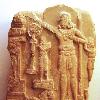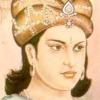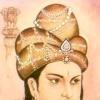

better Tags: Ashoka View |
Tags: Ashoka View |
Tags: Ashoka View |
|||||||||
Ashoka (Devan?gar?: ????, IAST: IASTA?oka, IPA-hnsa??o?k?IPA, 304 BC – 232 BC), popularly known as Ashoka the Great, was an Indian (Indian subcontinent) emperor of the Maurya Dynasty (Maurya Empire) who ruled almost all of the Indian subcontinent from 269 BC to 232 BC. One of Indias greatest emperors, Ashoka reigned over most of present-day India after a number of military conquests. His empire stretched from present-day Pakistan, Afghanistan in the west, to the present-day Bangladesh and the Indian state of Assam in the east, and as far south as northern Kerala and Andhra. He conquered the kingdom named Kalinga (Kalinga (India)), which no one in his dynasty had conquered starting from Chandragupta Maurya. His reign was headquartered in Magadha (present-day Bihar, India). He embraced Buddhism from the prevalent Vedic (Historical Vedic religion) tradition after witnessing the mass deaths of the war of Kalinga (Kalinga War), which he himself had waged out of a desire for conquest. He was later dedicated to the propagation of Buddhism across Asia and established monuments marking several significant sites in the life of Gautama Buddha. Ashoka was a devotee of ahimsa (nonviolence), love, truth, tolerance and vegetarianism. Ashoka is remembered in history as a philanthropic administrator. In the history of India Ashoka is referred to as Samraat Chakravartin Ashoka- the Emperor of Emperors Ashoka.
His name "IASTa?oka" means "without sorrow" in Sanskrit (a= no/without, soka= sorrow or worry). In his edicts (Edicts of Asoka), he is referred to as Dev?n?mpriya (Devan?gar?: ????????????)/IASTDev?na?piya or "The Beloved Of The Gods", and Priyadar?in (Devan?gar?: ??????????)/IASTPiyadass? or "He who regards everyone with affection". Another title of his is Dhamma (prakrit: ?????), "Lawful, Religious, Righteous".
Renowned British (United Kingdom) author and social critic H. G. Wells in his bestselling two-volume work, The Outline of History (1920), wrote of emperor Ashoka:
quoteIn the history of the world there have been thousands of kings and emperors who called themselves their highnesses, their majesties, and their exalted majesties and so on. They shone for a brief moment, and as quickly disappeared. But Ashoka shines and shines brightly like a bright star, even unto this day.
Along with the Edicts of Ashoka, his legend is related in the later 2nd century A?ok?vad?na (AshokavadanaIAST) ("Narrative of Asoka") and Divy?vad?na (DivyavadanaIAST) ("Divine narrative"), and in the Sinhalese (Sinhalese language) text Mahavamsa ("Great Chronicle").
After two thousand years, the influence of Ashoka is seen in Asia and especially the Indian subcontinent. An emblem excavated from his empire is today the national Emblem of India. In the History of Buddhism Ashoka is considered just after Gautama Buddha.
Title: Mauryan (Mauryan dynasty) Samrat
Othertitles: Samrat. Other titles include Devanampriya Priyadarsi, Dhammarakhit, Dharmarajika, Dhammarajika, Dhammaradnya, Chakravartin, Samrat, Radnyashreshtha, Magadhrajshretha, Magadharajan, Bhupatin, Mauryaraja, Aryashok, Dharmashok, Dhammashok, Asokvadhhan , Ashokavardhan, Prajapita,Dhammanayak, Dharmanayak
Full Name: Ashoka Bindusara Maurya
Religion: Buddhism, Humanism
Queen: Maharani Devi
Spouse 1: Rani Tishyaraksha
Spouse 2: Rani Padmavati
Spouse 3: Rani Kaurwaki
Issue: Mahendra, Sanghamitra,Teevala, Kunala
Royal House: Mauryan dynasty
Father: Bindusara
Mother: Rani Dharma or Shubhadrangi
Brothers: Vitthashoka, Susima
Birth Location: Pataliputra, Patna
Place Of Death: Pataliputra, Patna
Date Of Burial: Cremated 232 BC, less than 24 hours after death
Place Of Burial: Ashes immersed in Ganges River, possibly in Varanasi
Influenced By: Buddha � Chandragupta Maurya �Bindusara � Chanakya �Mahavira�Alexander the Great �Seleucus I Nicator �Diodotus I �Antiochus I Soter �
Influenced: Kunal � Harsha �Samudragupta �Ramagupta �Chandragupta II Kumaragupta �Skandagupta �Purugupta Vishnugupta
Reign: 273 BC-232 BC
Coronation: 270 BC
Predceded by: Bindusara
Succeeded by: Dasaratha Maurya



